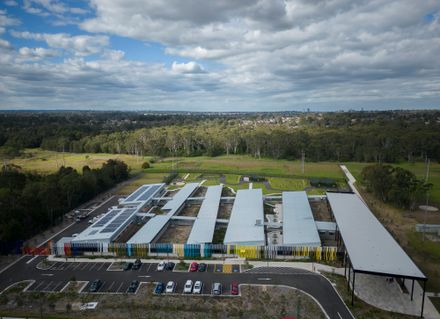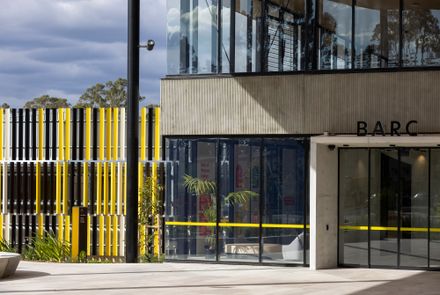Blacktown Animal Rehoming Center
ARCHITECTS
Sam Crawford Architects
DECONTAMINATION CONSULTANT
Prensa
THIRD PARTY REVIEWER
Stowe Australia
PROJECT MANAGER
Root Partnerships
MAIN CONTRACTOR
A W Edwards
LANDSCAPE ARCHITECT
Jmd Design
ARBORIST
Arterra
QUANTITY SURVEYOR
Bylett & Associates
PROJECT TEAM
Sam Crawford, Gabrielle Pelletier, Benjamin Chan, Scott Rowland, Henry Foley, Christine Guan, Sofia Nay, Louisa Gee, Jarrod Ruchalski, Ken Warr, Imogene Tudor, Anna Paton
FLOOD RISK ASSESSMENT
Catchment Simulation Solutions
GEOTECH ENGINEER
Douglas Partners
SERVICES ENGINEERS
Dsc
ACOUSTIC ENGINEER
Rodney Stevens
TRAFFIC ENGINEER
Ttpp
SECTION J CONSULTANT
Aspire Sustainability
ABORIGINAL HERITAGE CONSULTANT
Ambs
COLOUR CONSULTANT
Lymesmith
ACCESSIBILITY CONSULTANT
Morris Goding Access Consultin
WASTE CONSULTANT
Mra Consulting
BCA CONSULTANT
Bmg
SIGNAGE & WAYFINDING CONSULTANT
Urbanite
STRUCTURAL AND CIVIL ENGINEER
Northrop Consulting
YEAR
2023
LOCATION
Blacktown, Australia
CATEGORY
Healthcare Architecture, Animal Shelter
A new animal shelter attracts potential pet adopters | Bold color and a handful of six finger-like buildings connect to nature to create a safe and welcoming animal shelter that promotes pet adoption.
Blacktown Animal Rehoming Centre (BARC), located adjacent to the Western Sydney Parklands, was designed by Sam Crawford Architects (SCA), and is the largest building of its type in the Southern Hemisphere, housing up to 380 dogs and cats.
Each building houses a different function - kennels, a cattery, vet facilities, back of the house - to help improve assessment and holding efficiency.
The long finger-like design allows the animals to have a direct connection to the surrounding landscape, increasing their interaction with nature and people. This layout maximizes thermal, visual, and aural comfort, minimizing distress, assisting with rehabilitation, and providing amenities for staff.”
“Maximizing the connection with nature is such an important part of the design. For the animals obviously, but also as relief for staff compassion-fatigue, and to balance the necessary hard surfaces required for hygiene and durability. It also de-institutionalizes the spaces and makes them feel more welcoming.”
The buildings are linked by covered walkways allowing for different animal movement pathways - receiving, assessment, stray reclaim and surrender, adoption, and most importantly, separating dogs and cats.
The building housing individual kennels are at a domestic rural scale, where dogs are stimulated with views of nature via large glass windows and can rest or withdraw if needed behind screens.
This layout minimizes attention fatigue, and acoustic discomfort and supports staff safety. Highly durable materials withstand extreme wear and bacteria spread, whilst best practice passive thermal comfort considers climate and ventilation. Large exercise spaces overlook the adjoining parklands.
The light-filled reception building has a large extended roof sweeping up to create an iconic, open, easy-to-find entrance.
A civic space, it provides a secure and welcoming environment, with clear directions and circulation, ‘homely’ viewing rooms for potential pets, and a function area for educational events. Cats are housed in multicolored rooms, with playful sleeping boxes and climbing gyms.
A building housing a veterinary hospital and cattery promotes disease control and is fitted out with the latest technology for the treatment of injuries and desexing.
The facility sits lightly in an extensive landscaped area, with drought tolerant, shade-giving, and low maintenance planting promoting habitation of the very bird species that are the subject of the integrated art.
The landscape acts as bio-filtration at multiple points, promoting stormwater absorption across the site. Fun facts about cats and dogs are inscribed into pavements to educate the public. Hygienic, durable, robust, low maintenance and easy-to-clean materials were chosen.
Sustainable features include passive thermal comfort through maximizing cross ventilation, solar access, and water retention, together with sustainable technologies such as a 99 kWh solar PV array, EV car chargers, and heat exchange air-conditioning.
The multipurpose function area facilitates the center's strong community support goals by providing public education programs in animal training and pre-adoption courses for humans, aiming to maximize animal retention rates by adopters.






















